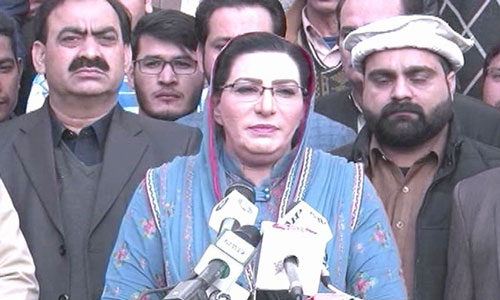Staff Reporter
Islamabad
The federal government on Thursday submitted a review petition against the Supreme Court’s verdict directing the parliament to legislate on the extension/appointment of an army chief and asked the top court that it be set aside.
“The review petition was filed [in the Supreme Court] because our legal team thoroughly, comprehensively, and closely reviewed all aspects of the decision and concluded that there are several legal gaps in the verdict,” prime minister’s aide Firdous Ashiq Awan said while talking to the media.
The review appeal lists the federal government, Prime Minister Imran Khan, President Arif Alvi and Army Chief Gen Qamar Javed Bajwa as petitioners.
“[There are] flaws in the verdict, and legal and constitutional faults surfaced in the decision. With due respect to the judiciary, the government wants rectification of the faults and has thus decided to file the review petition. The review petition is being filed ultimately in the higher public interest,” she added.
Prime Minister Imran Khan in August had granted a three-year extension to Gen Qamar Javed Bajwa, who was supposed to retire on November 29. The top court, led by the then chief justice of Pakistan Asif Saeed Khosa, however, had suspended the notification on November 26 due to irregularities in the manner of extension.
Speaking on Thursday, Firdous Awan said the option of legislation through the parliament, after filing the review petition, will remain intact, adding that Law Minister Farogh Naseem will brief the media in detail about this.
The petition, submitted by Attorney General Anwar Mansoor, questions the legal aspects of the judgement.
“The Impugned Judgment is bad in law and facts. The same is completely without jurisdiction, void ab initio and of no legal effect,” reads the petition submitted against the verdict.
It further says that the order “suffers from material irregularities” which have “converted the process from being one in aid of justice to a process of injustice”. It also claims that the court has “completely overlooked” the laws laid out in the Constitution as well as “vital laws”.
Furthermore, it has been insisted that the petition has been filed “in the interest of public good”.
The petition says that the “court should not have interfered on the grounds of public policy and collective conscience”.
“It is respectfully pointed out that glaring omissions and patent mistakes have crept into the Impugned Judgment, violating the law and the Constitution.
“The nature of the controversy at hand was really the rarest of the rarest cases in which Honourable Court should not have interfered on the grounds of public policy and collective conscience. In fact, the Honourable Court had no role to upset the age-long accepted conventions and the considered policy of the government,” says the petition.The petition notes that the court said that chosen representatives should decide matters pertaining to appointment and extension of the army chief and that people can “accept or reject” the decision taken through their chosen representatives.
“[…] With due respect this means that the appointment has to be made through the chosen representatives, who have left the matter to be dealt by conventions by not legislating for 7 decades and there is nothing wrong with this.”
The petitioner “with the highest respect” insisted that the judgement by the top court is “patently erroneous” and that the errors are “floating on the face of the record”.
The appeal says that the Supreme Court had “fundamentally failed to note” that the terms and conditions, service rights and tenure of a sitting official “can be regulated by departmental instructions, office memoranda, conventions, customs, usages and other executive instructions, provided they are not in violation of any statutory provisions”.
“In the present case, the appointment of the COAS was strictly in accordance with the settled departmental practice followed for seven decades or so.”
The attorney general, while arguing before the top court in November, had contended that the laws and rules governing the service issue of the army chief were “silent on the tenure” because if they were strictly followed, the entire armed forces would be left headless.










